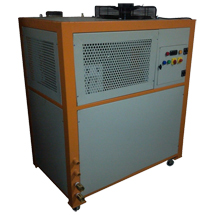Introduction
Compact chiller design represents a significant advancement in modern cooling technology, offering a perfect solution for industries that require efficient thermal management in limited spaces. Unlike traditional bulky chillers, compact chillers deliver exceptional performance in a smaller footprint, making them ideal for applications where space constraints and portability are critical. With their ability to provide precise temperature control, compact chillers are widely used across diverse industries such as healthcare, food and beverage, electronics, and industrial automation. These systems not only ensure optimal cooling performance but also align with sustainability goals by incorporating energy-efficient components and eco-friendly refrigerants. Their innovative design and adaptability cater to the growing demands of dynamic industries, making them a game-changer in the field of cooling solutions.
Key Features of Compact Chiller Design
Optimized Cooling Performance
Compact chillers deliver powerful cooling capacity within a reduced size. Advanced technologies such as microchannel heat exchangers and scroll compressors enable them to provide precise temperature control, making them suitable for sensitive applications like laser systems, medical imaging devices, and laboratory equipment.
Lightweight and Portable
The lightweight construction of compact chillers allows easy mobility. Many designs incorporate wheels or ergonomic handles, making them portable and ideal for temporary setups or mobile operations.
Integrated Systems
These chillers often feature built-in pumps, tanks, and controls, reducing the need for additional external components. This integration simplifies installation, minimizes setup time, and enhances reliability by reducing the number of connections.
Energy-Saving Features
- Variable Speed Drives (VSDs): These allow the compressor to adjust speed based on the cooling load, reducing energy consumption.
- Smart Controls: Adaptive control algorithms optimize energy usage by analyzing real-time cooling requirements.
- High Efficiency Heat Exchangers: Compact chillers maximize heat transfer with minimal energy loss.
Quiet Operation
Advanced engineering ensures that compact chillers operate with minimal noise, thanks to sound-dampening materials and vibration isolation systems. This makes them suitable for environments like offices, hospitals, and residential areas.
Durable and Robust
Constructed from high-quality materials such as stainless steel and aluminum, compact chillers resist corrosion and wear, even under harsh environmental conditions. This durability translates to lower maintenance requirements and longer service life.
Applications of Compact Chiller Design
- Medical and Healthcare
- Compact chillers are critical in medical settings for cooling diagnostic equipment such as MRI and CT scanners. They also play a role in laser systems for surgeries, ensuring precision by preventing overheating. Their small size and quiet operation make them suitable for clinical environments.
- Pharmaceutical Industry
- In drug manufacturing, maintaining precise temperature control is vital for chemical stability. Compact chillers are used in laboratories and manufacturing plants for cooling reactors, maintaining controlled environments for sensitive processes, and ensuring compliance with GMP (Good Manufacturing Practices).
- Food and Beverage Industry
- Compact chillers provide precise cooling for dairy products, chocolates, beverages, and frozen foods. Their ability to fit into limited spaces makes them ideal for small to medium-sized processing plants, ensuring product quality and safety.
- Industrial Automation
- In industries where machinery operates continuously, compact chillers cool CNC machines, welding systems, and injection molding equipment, preventing equipment downtime caused by overheating.
- Electronics and Semiconductor
- Compact chillers ensure stable cooling for semiconductor manufacturing, circuit board testing, and heat-sensitive components. Their precision makes them indispensable in ensuring product quality in high-tech industries.
- HVAC Systems
- Compact chillers are often integrated into HVAC systems to provide localized cooling in offices, hotels, and industrial spaces, particularly where conventional chillers cannot be installed due to space constraints.
Advantages of Compact Chiller Design
- Space Optimization
- Compact chillers are designed to maximize functionality while minimizing physical space. They are ideal for applications where floor space is premium, such as laboratories, small factories, or crowded data centers.
- Energy Efficiency
- Equipped with modern compressors and advanced heat exchanger technologies, compact chillers consume less energy. This reduces operational costs while supporting sustainability initiatives.
- Portability
- Many compact chillers are built with casters or handles, making them easy to transport between workstations or facilities. This is especially useful for industries that require flexible or temporary cooling solutions.
- Low Noise Operation
- Using sound-dampening materials and innovative fan designs, compact chillers ensure minimal noise during operation. This feature makes them suitable for environments such as hospitals, offices, and research labs.
- Ease of Installation
- Compact chillers often come as plug-and-play units with integrated pumps, control panels, and safety mechanisms, simplifying the installation process. This reduces downtime and costs associated with setup.
- Versatile Applications
- Compact chillers cater to a wide range of industries, from healthcare to food production, making them versatile. They can be adapted to handle different cooling media, including water, glycol mixtures, and refrigerants.
Conclusion
Compact chillers have emerged as a pivotal solution in industries that value efficiency, reliability, and environmental responsibility. Their ability to combine high performance with space-saving designs ensures they address the diverse needs of modern applications, from critical medical equipment cooling to precise thermal management in semiconductor manufacturing. The integration of smart control systems, low noise operation, and energy-saving features further enhances their appeal, reducing operational costs while contributing to sustainability goals. As industries continue to evolve, compact chillers are poised to remain at the forefront of innovation, supporting businesses in optimizing processes, minimizing downtime, and achieving their productivity goals. By prioritizing compact chiller designs, organizations can embrace advanced cooling technology that is both future-ready and environmentally conscious.

